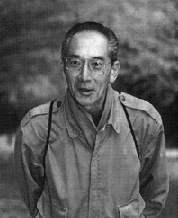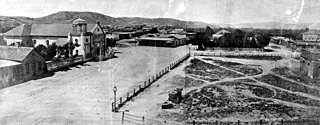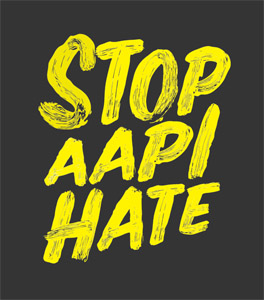
Yuji Ichioka was an American historian and civil rights activist best known for his work in ethnic studies, particularly Asian American Studies and for being a leader in the Asian American movement. An adjunct professor at UCLA, he coined the term "Asian American" in 1968 during the founding of the Asian American Political Alliance, to help unify different Asian ethnic groups, and was considered the preeminent scholar of Japanese American history.
Ethnic studies, in the United States, is the interdisciplinary study of difference—chiefly race, ethnicity, and nation, but also sexuality, gender, and other such markings—and power, as expressed by the state, by civil society, and by individuals. “The unhyphenated-American phenomenon tends to have colonial characteristics,” notes Jeffrey Herlihy-Mera in After American Studies: Rethinking the Legacies of Transnational Exceptionalism: “English-language texts and their authors are promoted as representative; a piece of cultural material may be understood as unhyphenated—and thus archetypal—only when authors meet certain demographic criteria; any deviation from these demographic or cultural prescriptions are subordinated to hyphenated status.” As opposed to International studies, which was originally created to focus on the relations between the United States and Third World Countries, Ethnic studies was created to challenge the already existing curriculum and focus on the history of people of different minority ethnicity in the United States. Ethnic studies is an academic field that spans the humanities and the social sciences; it emerged as an academic field in the second half of the 20th century partly in response to charges that traditional social science and humanities disciplines such as anthropology, history, literature, sociology, political science, cultural studies, and area studies were conceived from an inherently Eurocentric perspective. Its origin comes before the civil rights era, as early as the 1900s. During this time, educator and historian W. E. B. Du Bois expressed the need for teaching black history. However, Ethnic Studies became widely known as a secondary issue that arose after the civil rights era. Ethnic studies was originally conceived to re-frame the way that specific disciplines had told the stories, histories, struggles and triumphs of people of color on what was seen to be their own terms. In recent years, it has broadened its focus to include questions of representation, racialization, racial formation theory, and more determinedly interdisciplinary topics and approaches.
Asian American Studies is an academic discipline which critically examines the history, issues, sociology, religion, experiences, culture, and policies relevant to Asian Americans. It is closely related to other Ethnic Studies disciplines, such as African American Studies, Latino/a Studies, and Native American Studies.
Latino studies is an academic discipline which studies the experience of people of Hispanic ancestry in the United States. Closely related to other ethnic studies disciplines such as African-American studies, Asian American studies, and Native American studies, Latino studies critically examines the history, culture, politics, issues, sociology, spirituality (Indigenous) and experiences of Hispanic people. Drawing from numerous disciplines such as sociology, history, literature, political science, religious studies and gender studies, Latino studies scholars consider a variety of perspectives and employ diverse analytical tools in their work.
Chicana/o studies, also known as Chican@ studies, originates from the Chicano Movement of the late 1960s and 1970s, and is the study of the Chicana/o and Latina/o experience. Chican@ studies draws upon a variety of fields, including history, sociology, the arts, and Chican@ literature. The area of studies additionally emphasizes the importance of Chican@ educational materials taught by Chican@ educators for Chican@ students.
The UCLA Chicano Studies Research Center (CSRC) was founded in 1969 to foster multidisciplinary research efforts at the University of California, Los Angeles (UCLA). It is one of four ethnic studies centers established at UCLA that year, all of which were the first in the nation and have advanced our understanding of the essential contributions of people of color to U.S. history, thought, and culture. The centers remain the major organized research units in the University of California system that focus on ethnic and racial communities and contribute to the system's research mission.

The Asian Pacific American Labor Alliance (APALA) is a nonprofit organization of Asian-Pacific American trade union members affiliated with the AFL-CIO. It was the "first and only national organization for Asian Pacific American union members".
The East Coast Asian American Student Union is a 501(c)(3) nonprofit aiming to inspire, educate, and empower those interested in Asian American & Pacific Islander (AAPI) issues. Run by volunteers, ECAASU's advocacy work is conducted through outreach to AAPI students organizations across the country and educating individuals through various programs that are held over the course of the year. ECAASU hosts an annual conference, which is currently known as the largest and oldest conference in the country for Asian American students. The organization's membership is primarily composed of universities from the eastern United States while its annual conferences draw students and activists from throughout the United States. ECAASU was originally established in 1978 as the East Coast Asian Student Union (ECASU) before changing its name during 2005 conference. It currently attracts 1,000+ students to its annual conference. The largest ECAASU was held at University of Pennsylvania which was attended by almost 1,700 students. Similarly, the 2013 ECAASU conference held at Columbia University drew in over 1,500 students from over 200 different colleges. The 2020 ECAASU conference will be held on February 21-22nd in Pittsburgh, Pennsylvania.

Russell Charles Leong is an academic editor, professor, writer, and long-time Chen-style t'ai chi ch'uan student. The long-time editor of Amerasia Journal (1977–2010), Leong was an adjunct professor of English and Asian-American Studies at University of California, Los Angeles and currently serves as senior editor for international projects. He is the founding editor of the CUNY FORUM: Asian American / Asian Studies, published by the Asian American / Asian Research Institute - CUNY, and served as a Dr. Thomas Tam Visiting Professor at Hunter College/CUNY. He the author of Phoenix Eyes and Other Stories which received the American Book Award. His most recent publication, MothSutra, a graphic poem about New York City restaurant bicycle deliverymen, was released in 2015.
Amerasia Journal is a triannual peer-reviewed academic journal established in 1971 that covers Asian American studies. The journal regularly publishes special issues addressing a particular theme.

Mexican Americans have lived in Los Angeles since the original Pobladores, the 44 original settlers and 4 soldiers who founded the city in 1781. People of Mexican descent make up 31.9% of Los Angeles residents, and 32% of Los Angeles County residents.
The Asian American movement was a sociopolitical movement in which the widespread grassroots effort of Asian Americans affected racial, social and political change in the U.S, reaching its peak in the late 1960s to mid-1970s. During this period Asian Americans promoted antiwar and anti-imperialist activism, directly opposing what was viewed as an unjust Vietnam war. The American Asian Movement (AAM) differs from previous Asian American activism due to its emphasis on Pan-Asianism and its solidarity with U.S. and international Third World movements such as the Third World Liberation Front (TWLF).
The Third World Liberation Front (TWLF) rose in 1968 as a coalition of ethnic student groups on college campuses in California in response to the Eurocentric education and lack of diversity at San Francisco State College and University of California, Berkeley. The TWLF was instrumental in creating and establishing Ethnic Studies and other identity studies as majors in their respective schools and universities across the United States.
In 1968, the Third World Liberation Front (TWLF), a coalition of the Black Students Union, the Latin American Students Organization, the Pilipino American Collegiate Endeavor (PACE) the Filipino-American Students Organization, the Asian American Political Alliance, and El Renacimiento, a Mexican-American student organization, formed at San Francisco State University (SFSU) to call for campus reform. Another Third World Liberation Front formed at University of California, Berkeley in January 1969. These coalitions initiated and sustained the Third World Liberation Front strikes of 1968, one of the longest student strikes in US history.
The Asian American Political Alliance (AAPA) was a political organization started at University of California, Berkeley in 1968 that aimed to unite all Asian Americans under one identity to push for political and social action. The two main chapters were at UC Berkeley, and San Francisco State College, both of which became heavily involved in the larger Asian American movement throughout the 1960s, including at the Third World Liberation Front strikes at SF State and at UC Berkeley. The AAPA identified as an anti-imperialistic, Third World political organization that fought for self-determination and liberation for Asian Americans. They expressed solidarity and support for other people of color throughout the US and throughout the world, particularly in colonized or recently decolonized countries. The AAPA's participation in the Third World Liberation Front strikes at SF State and UC Berkeley resulted in the creation of a School of Ethnic Studies at SF State and an Ethnic Studies department at UC Berkeley. The AAPA was also involved in movements such as the Black Power Movement and the anti-Vietnam War movement. Although both main chapters were short-lived and disbanded in 1969, the AAPA played a large role in the Asian American movement and was influential in encouraging other Asian Americans to get involved in political action.
Don Nakanishi was a professor and director of the Asian American Studies Center at the University of California, Los Angeles. Nakanishi is known for establishing Asian American Studies as a "viable and relevant field of scholarship."
The Intercollegiate Chinese for Social Action (ICSA) was a student organization formed in 1967 at San Francisco State College. The group organized various community-oriented events and service projects, particularly in the Chinatown community in San Francisco. In 1968, the ICSA joined the Third World Liberation Front (TWLF), a coalition of different student groups advocating for campus reform at SFSU. The ICSA also actively protested traditional Chinese leadership, in particular the Six Companies in San Francisco.
Lucie Cheng was a sociologist known for her work in Asian American studies, as well as being the first permanent director of the Asian American Studies Center, UCLA. She was also one of the first American academics to forge links with mainland Chinese academic institutions after the formalisation of Sino-US relations.
A Mexican American is a resident of the United States who is of Mexican descent. Mexican American-related topics include the following:

Stop AAPI Hate is a nonprofit organization that runs the Stop AAPI Hate Reporting Center, which tracks incidents of hate and discrimination against Asian Americans and Pacific Islanders (AAPI) in the United States. The organization was formed in 2020 in response to racist attacks on the Asian community as a result of the COVID-19 pandemic.






